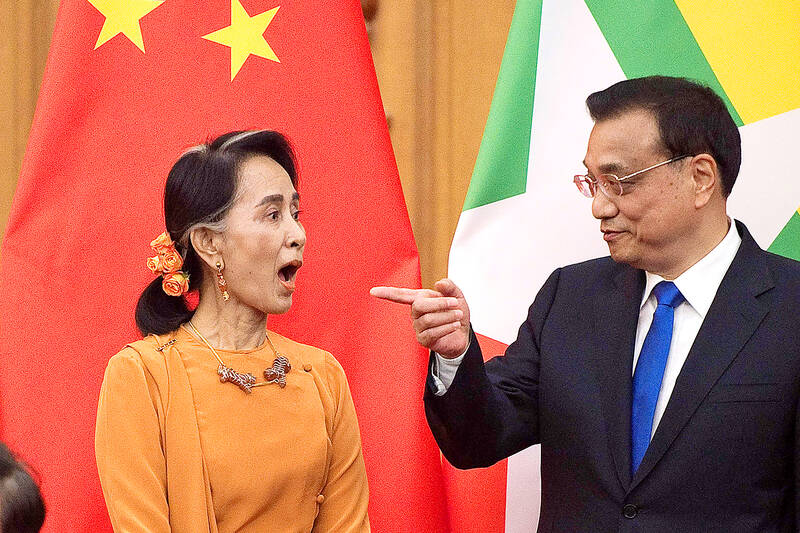Former Chinese premier Li Keqiang (李克強), who gained a reputation as a reformer, but later found himself sidelined by Chinese President Xi Jinping (習近平), yesterday died of a heart attack just months after stepping down as the nation’s No. 2 official.
He was 68.
Li passed away in Shanghai after all rescue efforts failed, a statement posted on the government’s Web site said. His death sparked a huge outpouring of grief on China’s tightly controlled Internet, with most comments expressing shock and sadness over his passing.

Photo: AFP
“Rest in peace, people’s premier,” one top comment said on Sina Weibo, where the news was viewed about 1.3 billion times.
In Taipei, the Mainland Affairs Council offered its condolences to Li’s family. It added that it would continue to keep a close eye on related developments in China.
A trained economist who once rivaled Xi for the nation’s top job, Li championed pro-market reforms and extolled the benefits of a more liberal economic vision while steering the world’s second-largest economy through a trade war with the US, a property crisis and the COVID-19 pandemic.
However, his influence steadily declined over his decade as head of government, with Xi taking over key responsibilities traditionally reserved for the premier.
Xi’s push to shape economic policy was a harbinger of a bigger shakeup in the Chinese Communist Party that played out last year, when he secured an unprecedented third term. Despite being eligible to stay on the seven-member Politburo Standing Committee, Li was left off China’s most powerful body and replaced as premier by a Xi ally, Li Qiang (李強).
“Some are suggesting that Li [Keqiang] is a symbol of a bygone reform era,” said Richard McGregor, senior fellow for East Asia at the Lowy Institute in Sydney. “He is more a symbol of the Xi Jinping era, in which putative reformers like Li were sidelined and stripped of agency, even though he was ranked number two in the party hierarchy.”
China’s state media published an official obituary, commending Li Keqiang’s work as premier, including promoting economic reform and resolving problems relating to people’s livelihoods — such as job creation, education and housing.
It also highlighted his work under Xi’s leadership and noted his continued backing of Xi after stepping down as premier, saying he “firmly supported” anti-corruption efforts.
In 2020, Li Keqiang set off a nationwide debate on poverty alleviation when he reminded the public that two-fifths of China’s population earned just 1,000 yuan (US$137) a month on average.
“It’s not even enough to rent a room in a medium-sized Chinese city,” he said at the annual national parliament meeting in May.
Internet users paid tribute to Li Keqiang, with many highlighting his comments on poverty.
Others shared his remark that “once China’s door is opened, it will never be closed again” — a statement that stands in contrast with the nation’s widening divisions with the US and Europe as Xi’s power expands.
Additional reporting by CNA

The Ministry of the Interior (MOI) is to tighten rules for candidates running for public office, requiring them to declare that they do not hold a Chinese household registration or passport, and that they possess no other foreign citizenship. The requirement was set out in a draft amendment to the Enforcement Rules of the Public Officials Election and Recall Act (公職人員選舉罷免法 ) released by the ministry on Thursday. Under the proposal, candidates would need to make the declaration when submitting their registration forms, which would be published in the official election bulletin. The move follows the removal of several elected officials who were

The Republic of China (ROC) is celebrating its 114th Double Ten National Day today, featuring military parades and a variety of performances and speeches in front of the Presidential Office in Taipei. The Taiwan Taiko Association opened the celebrations with a 100-drummer performance, including young percussionists. As per tradition, an air force Mirage 2000 fighter jet flew over the Presidential Office as a part of the performance. The Honor Guards of the ROC and its marching band also heralded in a military parade. Students from Taichung's Shin Min High School then followed with a colorful performance using floral imagery to represent Taiwan's alternate name

FOUR DESIGNATED AREAS: Notices were issued for live-fire exercises in waters south and northwest of Penghu, northeast of Keelung and west of Kaohsiung, they said The military is planning three major annual exercises across the army, navy and air force this month, with the navy’s “Hai Chiang” (海強, “Sea Strong”) drills running from today through Thursday, the Ministry of National Defense said yesterday. The Hai Chiang exercise, which is to take place in waters surrounding Taiwan, would feature P-3C Orion maritime patrol aircraft and S-70C anti-submarine helicopters, the ministry said, adding that the drills aim to bolster the nation’s offshore defensive capabilities. China has intensified military and psychological pressure against Taiwan, repeatedly sending warplanes and vessels into areas near the nation’s air defense identification zone and across

A Chinese takeover of Taiwan would severely threaten the national security of the US, Japan, the Philippines and other nations, while global economic losses could reach US$10 trillion, National Security Council Deputy Secretary-General Lin Fei-fan (林飛帆) wrote in an article published yesterday in Foreign Affairs. “The future of Taiwan is not merely a regional concern; it is a test of whether the international order can withstand the pressure of authoritarian expansionism,” Lin wrote in the article titled “Taiwan’s Plan for Peace Through Strength — How Investments in Resilience Can Deter Beijing.” Chinese President Xi Jinping’s (習近平) intent to take Taiwan by force